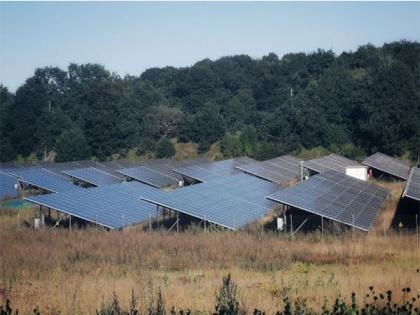Solar rooftops and pumps offer major opportunities for MSMEs in India and Africa: ISA DG
By ANI | Updated: August 24, 2025 16:05 IST2025-08-24T15:56:54+5:302025-08-24T16:05:13+5:30
New Delhi [India], August 24 : Solar rooftop installations and solar pumps are some of the other great opportunity ...

Solar rooftops and pumps offer major opportunities for MSMEs in India and Africa: ISA DG
New Delhi [India], August 24 : Solar rooftop installations and solar pumps are some of the other great opportunity sectors for MSMEs in India as well as in African countries, said Ashish Khanna, Director General, International Solar Alliance (ISA), speaking at an event organised by industry body PHDCCI.
The ISA director highlighted India's achievements in the solar sector, adding that there are vast opportunities for MSMEs in India's solar journey and even markets abroad.
"The other big opportunity is solar pumps. Thankfully, due to technology, the cost of solar pumps has come down so much that the world needs to switch away from diesel pumps to solar pumps now. India has right now done about 20 lakh. It plans to do 50 lakh. Imagine the size of the business where each pump costs roughly about USD 10,000, 8 lakh rupees. Think of how much business needs to be done across every village, reducing the cost to the farmer, making them part of the solar supply chain, becoming better for the environment and creating economic wealth. So these are the opportunities in India.
"Now let me tell you what the opportunities are in the 144 countries. I was in Ethiopia last week, a country of about 130 million people, 13 crore, 13 crores. They alone have only 10 per cent of the arable land under irrigation. And the head of the country is telling me I desperately need 1 million solar pumps for food security because Africa is importing 400 billion dollars' worth of expertise of such a level that does not exist in Africa. So in the interim, they are going to be dependent on either India or China or one or two other countries to actually meet this demand," he added, highlighting the opportunities in the solar sector.
Just a decade ago, India's solar landscape was in its infancy, with panels dotting only a few rooftops and deserts. Today, the nation has raced ahead to script history: India has officially surpassed Japan to become the world's third-largest solar power producer. According to the International Renewable Energy Agency (IRENA), India generated an impressive 108,494 GWh of solar energy, leaving Japan behind at 96,459 GWh.
India's cumulative solar power capacity stood at 119.02 GW as of July 2025. This includes 90.99 GW from ground-mounted solar plants, 19.88 GW from grid-connected rooftop systems, 3.06 GW from hybrid projects, and 5.09 GW from off-grid solar installations, reflecting the country's diverse approach to expanding renewable energy.
India's progress in the renewable energy sector reflects the country's focused policies and strategic planning under national leadership. As part of the pledge made at COP26, efforts are being directed towards reaching the target of 500 GW of non-fossil fuel electricity capacity by 2030. This commitment is seen as a key step in India's clean energy transition and its broader climate goals.
India's solar manufacturing sector includes key components like solar modules, solar PV cells, and ingots and wafers. Producing these within the country supports the domestic economy and reduces dependence on imports. In just one year, solar module manufacturing capacity nearly doubledfrom 38 GW in March 2024 to 74 GW in March 2025. Similarly, solar PV cell manufacturing rose from 9 GW to 25 GW. A big milestone was the start of India's first ingot-wafer manufacturing facility (2 GW), further strengthening the entire solar supply chain.
This rapid growth in domestic capacity is strongly supported by government policies. To promote Indian-made solar products, the government has made it mandatory for projects under schemes like the Rooftop Solar Programme, PM-KUSUM, and CPSU Scheme Phase II to use panels and cells made in India.
Disclaimer: This post has been auto-published from an agency feed without any modifications to the text and has not been reviewed by an editor
Open in app